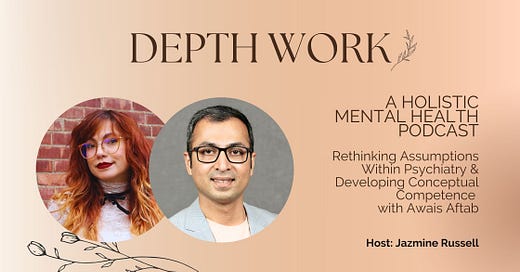Rethinking Assumptions Within Psychiatry & Developing Conceptual Competence
A Depth Work Conversation with Awais Aftab
“Any movement that aspires to be critical must be self-critical. There is value in approaching 'critical' not as an identity, a label, or a dividing line, but rather as a mode of engagement, as a virtue of philosophical and scientific thought. Critical psychiatry, if it is to embody this virtue, can only do so by insisting that it is a 'theory in the making' and by demonstrating continuous self-criticism, questioning, re-examination, and exploration of new possibilities.”
- Awais Aftab, Conversations in Critical Psychiatry
To move beyond binaries in mental health, we must complicate questions such as: ‘to medicalize or not to medicalize?’ or ‘is it a biological or a psychological problem?’ Since psychiatrists get almost exclusively medical training, Dr. Aftab advocates for what he calls “conceptual competency,” problematizing basic assumptions about the mind and brain that can prevent clinicians from truly supporting people and safeguarding their agency. In this episode, we explore the tensions between orthodox psychiatry and its critics, the future of psychiatric diagnostics, and how learning from philosophy and neuroscience can bring fresh perspectives.
In this episode we discuss:
conceptual competency
ways in which critical psychiatry/psychology could benefit from being self-critical
how modern neuroscience can help break down old binaries
how to decide where to intervene across biological, psychological, social factors
ADHD as an example of complex causal factors
childhood trauma and brain/biological changes
why issues in broader medical disciplines apply to psychiatry
pluralism and how can disciplines can come together
the future of diagnostics beyond the DSM era
Dr. Awais Aftab is clinical assistant professor of psychiatry at Case Western Reserve University and practices as a psychiatrist in Cleveland, OH, USA. His academic, educational, and public-facing work focuses on conceptual and critical issues in psychiatry. He led the interview series “Conversations in Critical Psychiatry” for Psychiatric Times, and a book adaptation has been published by Oxford University Press. He is a senior editor for the journal “Philosophy, Psychiatry, & Psychology.” He peer-reviewed work has been published in top psychiatric journals, he has written for the New York Times, and has been quoted in publications such as the LA Times, VICE News, and the Rolling Stones Magazine. He blogs online at his Substack newsletter Psychiatry at the Margins, which has more than 10,000 subscribers from 120 countries. (https://psychiatrymargins.com/).
Links
(mentioned) The Entangled Brain by Luiz Pessoa
Resources:
Get the book: Mad Studies Reader: Interdisciplinary Innovations in Mental Health
Become a member: The Institute for the Development of Human Arts
Train with us: Transformative Mental Health Core Curriculum
Enrollment is now open for Spring 2025 Cohorts!
Enrollment closes on Friday, February 28
22 hours of content • 50 faculty • Accessible pricing • Self-paced options are also available
Continuing Education (CE) credits are offered
IDHA developed the Core Curriculum to shift dominant medicalized narratives toward a paradigm of humanity, care, and support. Our goal is to help fill a critical gap in both mental health education and movement organizing, bridging a range of stakeholders and amplifying an abundance of tools and practices.
This curriculum will expose you to perspectives and approaches that you will not find in any mainstream education setting, equip you with the skills and strategies to become a more justice-informed care provider, and help you better center the agency and self-determination of those you seek to support.
The curriculum is designed as an introductory resource for those interested in exploring the challenges of our current mental health system, the history of how we got to where we are today, and gaining skills in how to transform care — but who are unsure where to begin. It is a one-of-a-kind learning and unlearning journey.
Sessions & Information about the host: JazmineRussell.com
Disclaimer: The DEPTH Work Podcast is for educational and entertainment purposes only. Any information on this podcast in no way to be construed or substituted as psychological counseling, psychotherapy, mental health counseling, or any other type of therapy or medical advice.







Jazmine, thank you for this discussion!